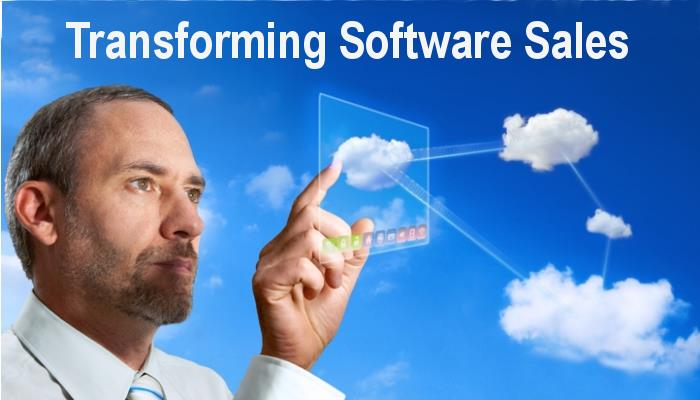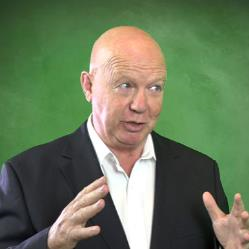 "How to achieve sustainable software sales growth" - discussion with John Smibert.
"How to achieve sustainable software sales growth" - discussion with John Smibert.
Significant changes confront the software industry.
The buyers have changed the way they buy. Cloud means we no longer achieve big upfront licence fees. These changes, and more, are driving a transformation in the way software providers sell and provision software. How can you respond to ensure sustainable success?
 Tony Hughes is an old master at selling software and a thought leader in adapting to the new way.
Tony Hughes is an old master at selling software and a thought leader in adapting to the new way.
So I asked Tony for his advice on how to be successful in selling in the new software environment.
Tony agreed. "The era of doing a big enterprise sale and then the salesperson disappearing, with the client struggling to get the value is really gone".
In this discussion Tony outlined the key strategies that software providers need to deploy in order to transform their business in a way that will ensure they survive and grow. He elaborates on risk sharing and values alignment. He emphasises the importance of being in lockstep with the buyer journey from early in the process and not losing sight of the specific customer problem being solved.
See Tony's full interview below for some enlightening advice and guidance to achieve sustainable growth in our software sales.
Tony is a leading author and keynote speaker in the world of B2B sales and sales leadership. He is well known for his strategic selling book "The Joshua Principle" and for the RSVPselling methodology.
See more of the 'TALKING SALES' series here
Interview
John: Hello! I've got Tony Hughes with me again - welcome back, Tony!
Tony: Thanks, John - good to be here!
John: Hey Tony, you've got enormous experience in the software industry. You used to be the CEO of a software company locally, and I know that you've got good advice, you still work with lots of organisations selling software. The software world is changing dramatically, with cloud and so on. What's your advice on how to be successful in selling in the software environment?
Tony: Well, the interesting thing today is that selling software to businesses, especially to big enterprises, the balance of power has changed quite dramatically, and buyers now want to trial, they want to test things before they'll ever commit.
John: And cloud allows that to happen, doesn't it?
Tony: It does, it does. The whole thing of software as a service delivered over the cloud means that people can start with a small group and then grow out. The era of doing a big enterprise sale and then the salesperson disappearing, with the client struggling to get the value is really gone.
John: With a pocket full of money and...
Tony: Yes, exactly - all of those things are gone. Right now we have shared risk, which I think is really good, there's values alignment there for buyer and seller. My advice to people selling software solutions is to absolutely be very clear about the problem they're solving. Often what happens when we're invited into an opportunity is the customer is really focused on doing a comparative analysis - they want to know what does your product do, does it comply with their needs - and all of those things, and what gets lost is why they need to implement. So, the good salespeople focus on what are you trying to achieve with implementing our product.
John: And that why can be quite different from client to client, or even within clients, from different department to department or area to area within an organisation. True?
Tony: Yes, it really can. If you look at customer relationship management, CRM, software as an example... Depending on whose statistics you believe, anywhere between a third to 70% of those implementations don't meet their stated objectives.
John: And why is that?
Tony: Well, it's very easy to end up with the world's most expensive context database and pipeline forecasting tool that no one believes.
John: [laughs] I've seen that before.
Tony: Yes. Well, the reality is though that organisations will implement a CRM because they had a problem occur. Maybe they want to reduce customer churn, maybe they're wanting to be more customer-centric and support customer experience and bring sales and marketing together, so it really depends on what they're trying to achieve. And if the salesperson can get focused on what outcomes are you needing to achieve, where's the business case for making the necessary funding... Because it's a giant mistake to underfund any of these projects, especially CRM, because you're change managing salespeople, like herding cats, and then you need to focus on where are the risk for them, and that's your opportunity to bring insight.
John: You've started by saying that we can get stuck in that analysis, the customer analysing the number of providers and so on. In my experience that tends to be late in the buying process, and typically one of the providers will have been right up the front, sowing the seeds, challenging the customer, driving the thought changes that the customer needs to have. In your experience, typically all the winners of the business, those people doing that, they are the ones focused on the why, what the value is.
Tony: Yes. Most of the time when a large organisation comes to market and they start assessing people, most of the time someone's been there early, really influencing the agenda; it's not that you can't win if you're late to the table, but it's certainly far more difficult.
John: Yes, it's tough.
Tony: Being strategic by definition means get there early engaging with senior people, helping them establish the business case and really setting an agenda; ~align~ your strengths but things that are also very good for the client.
John: So never respond to an RFP or tender if you weren't there, before it was...
Tony: Well, I wouldn't say never respond because you can win, but you've got to be very clear about what defines a well-qualified prospect. What does that customer need to believe that makes them line up well for us to be able to provide the right solution for them?
John: But typically if you drag in at the RFP stage, you're going to be in that analysis process, and you really are not in a position to get back to driving what the value is in the business.
Tony: Yes. And that's why if you're late into an opportunity, the process of qualification is very important. It's important to lose quickly if you're late into an opportunity, but if you're early and you're going to set the agenda, then you want to win slowly; you want to make those investments in people and setting the agenda.
John: Great advice, Tony - I think good value for a lot of salespeople and sales managers out there. I appreciate it!
Tony: Thanks, John!
****************
More interviews with Tony Hughes:
***************

Your Invitation: I invite you to join the Sales Leader Forum group on LinkedIn where you can experience informative discussions with your peers and sales thought leaders on subjects like the one we have discussed here. I also invite you to subscribe to the
- Sales Leader Resource Centre here
- Sales Leader YouTube channel here (300+ sales leadership videos)
Please Share: If you valued this article, please share via your Twitter, LinkedIn, Google+ and Facebook social media platforms. I encourage you to join the conversation or ask questions. So feel free to add a comment on this post - I promise to respond. If inclined please follow my LinkedIn post page here.
Want to touch base? If you have questions please feel free to contact me - email: john.smibert(at)salesleaderforums.com, Phone: +61 404857893 or Skype: john.smibert